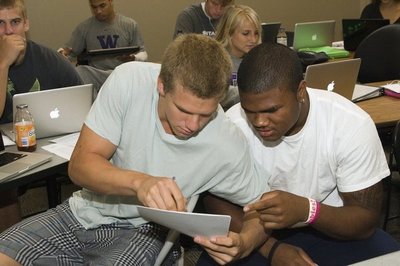August 5, 2010
LEAP: Training new student athletes in the rigors of college academics
They’ve excelled in high school sports and been recruited to the UW, but before freshman athletes can take their places on the team, some of them go through an “academic boot camp.”
An award-winning boot camp, in fact. The summer LEAP program, sponsored by Intercollegiate Athletics, the English Department and Undergraduate Academic Affairs, recently won the National Association of Academic Advisors for Athletics 2010 Model Practices Award.
LEAP stands for Learning + Experience + Achievement Program, and it’s an intensive four-week introduction to what it means to be a college student at a top university. Fifty-one student athletes complete the program Aug. 6, and they’ll leave after having had a crash course in writing, critical thinking and planning for success. Oh, and they’ll pick up some college credits, too.
LEAP is in its fifth year and has a fine track record. Of the 20 students who attended the first year, seven have graduated and nine are on track to graduate this year. The others left the University in good academic standing.
“We’ve had some kind of bridge program since I’ve been here, and that’s 11 years,” said Pam Robenolt, who directs the LEAP program. “But we used to do it during sports camps in the fall, and that wasn’t ideal. The athletes would study with us in the morning and have sports the rest of the day.”
In those days, the program consisted of three-day segments of a variety of subjects, to give the athletes a taste of the academic world. “There were a lot of benefits to it, but it wasn’t really an indication of what a class would be like,” Robenolt said.
Then, five years ago, the National Collegiate Athletic Association changed the rule that had prohibited athletes from being brought to campus before the camps, and Robenolt sought a redesign for the program. She found her answer in English 108, a “writing ready” program the English department was teaching for the Early Fall Start program.
Now the athletes take English 108 for five credits and a grade, along with a linked, ungraded study skills class for which they get one credit.
“Writing in college is a lot different from writing in high school,” Robenolt said, “and some student athletes don’t come here with the same skill set as other students. We want them to learn how to think critically, how to analyze a text and how to express their ideas in writing.”
To that end, students spend a lot of time doing writing and getting feedback. They write a two-page paper the very first night, and write a five-to-six-page paper every week. It’s a lot of work, but the students seem to appreciate it.
“I’ve learned a lot about how I write, things I can do better, things I can do to prepare myself. It’s been amazing,” said Kaitlin Ingleby, a pitcher on the softball team who came to the UW from Portland, Ore. “The one-on-one time has been most helpful. I can write a draft, turn it in, get it back that afternoon, take it to a tutor and they get your mind going, thinking about how you can expand on your ideas. It’s so helpful to have the tutors here.”
There are, in fact, eight tutors working with the group, in addition to three full-time staff members. During the study skills session, students often work one-on-one or in small groups, talking about lessons from English 108 or getting feedback on assignments. There are also guest speakers — such as representatives from the Office of Minority Affairs & Diversity, sports psychologists and nutritionists.
“They don’t let you fail here, they don’t let you fall behind,” Ingleby said. “They’re not going to let you do that in this program. They want to make sure they give you all the support you need.”
“It’s not like a class you go to and then go home and you’re on your own,” added football recruit DiAndre Campbell. “You always have a support system no matter what, and they get on you if you slack off. They make sure you push yourself.”
Robenolt said most students are enthusiastic despite the work. “They want to be college students,” she said. “This is so different from high school, so it feels like college already and that’s really exciting.”
The athletes also get to go beyond the campus for three field trips to city neighborhoods. This year they went to the downtown area, to the International District and to Capitol Hill. Robenolt said their schedules are so tight during the academic year that they barely know anything outside the campus exists, so the program introduces them to places they can go easily on the bus.
Robenolt is proud that the program has won the award, for which she had to submit a complex application. “They had different categories,” she said. “We entered LEAP in a Special Programs category, but we won the overall award. Of all the entries, LEAP won the Model Practices Award.”
Meanwhile, having completed LEAP, the athletes are headed out — some back home and some to camps for their sport. But the support they receive from Robenolt and her staff will continue when fall quarter begins. All will be followed through their freshman year, and for some with special needs, the support will continue as long as they’re students here.
“A lot of people who enjoy working in this environment feel there’s a social justice component to it,” Robenolt said. “We’re working with a lot of first-generation students, a lot of low-income students, a lot of underrepresented students. We’re able to work one on one or in small groups as long as they need the support. You can see some amazing transformations with these students. LEAP is where it starts.”

